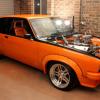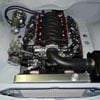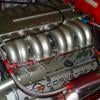We have not got any in stock i had one on back order for mine i ended getting the CSV they are basicaly the samemines a CSR-929C BILLET EWP HOLDEN V8 CLEAR
http://www.proraceproducts.com.au/?p=1143
the good thing about the csr pumps is if the pump dies you can buy replacement pumps a its just a bolt in part to keep the costs down
Water Pumps
#26
 _mumbo_
_mumbo_
Posted 13 June 2011 - 02:21 PM
#27
 _2wild4u_
_2wild4u_
Posted 15 June 2011 - 11:31 PM

#28

Posted 17 June 2011 - 10:59 AM
Re: the electric systems "not cavitating". That's not an argument you can use - there's no evidence, it seems to be a manufacturer's claim that nobody has seen any backing of. Put a clear hose on and do a thorough test and then it might be an argument but you'd still need to prove the original one was cavitating so that there was some contrast. IF they don't cavitate (which is quite possible) it's probably half because of the restrictor. Put a restrictor on your mechanically pumped system and it'll probably stop cavitating too lol, just make it work against a higher pressure (although it'll probably cavitate if it's got a crappy pressed sheet impeller). That isn't rocket science
Man, I really hope you didn't actually think that I thought differently. I get the shits bad when I say something, and then someone reads it wrongly and clearly assumes I'm an idiot, and follows that up by trying to lecture me on some dumbed down shit. I have studied fluid mechanics, but I don't think you need to do that to understand cooling systems.As I understand it , there is no net increase in pressure in the system, just higher pressure ahead of the pump and lower pressure behind it.
If you are just pointing that out for the general benefit of people reading this thread, to clarify, no worries.
Edited by Heath, 17 June 2011 - 11:01 AM.
#29
 _mumbo_
_mumbo_
Posted 17 June 2011 - 12:02 PM
#30

Posted 17 June 2011 - 02:26 PM
#31

Posted 17 June 2011 - 03:09 PM
#32

Posted 20 June 2011 - 09:55 PM
I know the 383 we are buildin for a certain Lh is getting the electric water pump, They look shit hot and they work!!
cheers Ed
#33

Posted 21 June 2011 - 12:44 AM
I don't see how you get more HP with an electric pump if you are running an alternator. The HP required to turn the alternator to turn the pump should be around the same as turning the pump directly.
If you don't have a speed controller the electric pump will pump more water than the mechanical pump in the lower rpm range. Therefore the electric pump should have more cooling capacity than the mechanic pump in the lower rpm range. The electric pump should also be drawing more power than the mechanical pump in the lower rpm range.
If you need more flow than a good mechanical pump produces in the lower rpm range then your cooling system has a problem.
Edited by ls2lxhatch, 21 June 2011 - 12:48 AM.
#34

Posted 21 June 2011 - 08:12 AM
If thats the case why do we all put thermo fans instead of normal fans? I think a davies craig 12inch fan draws 10 amps? Times that by 2 for your radiator, your three times the amount of the water pump.
I dont think too many ppl suffer over heating in the lower rpm from a water pump must be other problems, but an engine that is pulling 6000rpm + will more then likely have a water pump cavitating, Hence why HDT (who had more money then you and i to do testing) change pulley sizes to slow the pump down - no good down low but there engines were never down low. So to go and slow the pump down with a different pulley on a street car is asking for it.
I think electric water pumps are great, Thats why all car makers are running electric fuel pumps electric thermo fans!!
Id like to add that constant temp is required more then keeping it cold as such
AS mumbo said "That is not science its just the way it is."
No point arguin over "Science"
Cheers
ED
#35
 _mumbo_
_mumbo_
Posted 21 June 2011 - 09:43 AM
Mine will idle all day long on a 40 deg day its more the high RPM but evan then its not that bad its just with a electric pump it warms up faster and stay at a consistant temp. I didnt have a problem with a mechanical pump it is just better with a electric one, i dont know if it makes more or less HP and i dont think anyone would feel the diferance anyway.I would like to see the dyno results.
I don't see how you get more HP with an electric pump if you are running an alternator. The HP required to turn the alternator to turn the pump should be around the same as turning the pump directly.
If you don't have a speed controller the electric pump will pump more water than the mechanical pump in the lower rpm range. Therefore the electric pump should have more cooling capacity than the mechanic pump in the lower rpm range. The electric pump should also be drawing more power than the mechanical pump in the lower rpm range.
If you need more flow than a good mechanical pump produces in the lower rpm range then your cooling system has a problem.
#36

Posted 21 June 2011 - 12:47 PM
If thats the case why do we all put thermo fans instead of normal fans?
The benefit of running thermo fans is that you can turn them off at highway speed and run them at full power at idle. It also gives you the freedom to mount the radiator anywhere.
Thats why all car makers are running electric fuel pumps electric thermo fans!!
The benefits of electric cooling fans and fuel pumps are obvious but not relevant when taking about electric water pumps. How many car makers are running electric water pumps?
Id like to add that constant temp is required more then keeping it cold as such
A properly configured cooling system should maintain a consistent temperature regardless of how the water is pumped.
No point arguin over "Science"
If the alternator uses less power to produce electricity than the amount of power that can generated by the electric motor then you have defied physics and created a perpetual engine.
Most of the power required to drive the mechanical water pump is required to drive the impeller. The amount of power required to drive the impeller to pump water at a given rate will be the same regardless of how the impeller is driven. The electric pump driven by an alternator should have similar if not greater losses than the losses driving a mechanical pump producing the same flow.
There are benefits of running an electric water pump but in most cases power gain is not one of them.
#37
 _Bomber Watson_
_Bomber Watson_
Posted 21 June 2011 - 01:08 PM
The electric pump driven by an alternator should have similar if not greater losses than the losses driving a mechanical pump producing the same flow.
Alternator gets hot creating the charge and electric water pump motor gets hot spinning the impeller, so your loosing energy as heat twice. I would be very surprised to see equal losses, wouldnt be surprised at all to see an increased loss.
All other losses, ie friction of the belt on the pulley and friction of the bearings are basically equal, perhaps a very slight gain by loosing one pulley ie no frictional loss on the water pump pulley....
Cheers.
#38

Posted 21 June 2011 - 01:18 PM
Edited by ls2lxhatch, 21 June 2011 - 01:27 PM.
#39
 _evil UC hatch_
_evil UC hatch_
Posted 21 June 2011 - 01:51 PM
#40
 _Bomber Watson_
_Bomber Watson_
Posted 21 June 2011 - 02:18 PM
I just wanted to agree with Andy again to see if i could freak him out. Seems i have done so.
The big question that remains is 1500rpm fast enough? Going by the feedback from the guys who have actually used the things yes, yes it is.
I suppose if your cooling system is at its peak efficiency with the pump impeller spinning that fast then it wouldnt really make a difference. And yes you would get some HP gains in the upper RPM area...
Seems everyone agrees, can we have a big hug now?
Cheers.
Edited by Bomber Watson, 21 June 2011 - 02:19 PM.
#41

Posted 21 June 2011 - 02:19 PM
If the mechanical pump is pumping too much water in a race engine that is constantly at 8000 rpm then you would change the pulley and still be in front of the electric pump.
It is possible that for a street engine that also sees low rpm use that the under drive pulley would mean the flow would be insufficient at low rpm so you could not use the under drive pulley. In this case the electric pump would have an advantage over the mechanical pump at 8000 rpm. According to Stewart Components their high-flow water pumps use 2.26 HP to produce 180 GPH at 4000 rpm so if you double that for 8000 rpm the electric pump will save you less than 2.26 HP at 8000 rpm.
Edited by ls2lxhatch, 21 June 2011 - 02:26 PM.
#42
 _Bomber Watson_
_Bomber Watson_
Posted 21 June 2011 - 02:30 PM
Didnt think it would take like 10 or so HP to spin a mechy water pump, after all i doubt you would put 10hp through a standard V belt...
Cheers.
#43
 _evil UC hatch_
_evil UC hatch_
Posted 21 June 2011 - 03:02 PM
#44

Posted 21 June 2011 - 07:17 PM
So The Pros and cons are pretty much 1for1 Except the COST! Cost kills the pro's!
For pros i will add they look shit hot (more so if on a bullet timing case cover)
Cons Cost.
#45

Posted 21 June 2011 - 07:40 PM
#46
 _evil UC hatch_
_evil UC hatch_
Posted 21 June 2011 - 07:41 PM
#47

Posted 21 June 2011 - 07:41 PM
#48

Posted 21 June 2011 - 09:11 PM
A 12V water pump drawing 6A = 72W or 0.0962HP This is waht the CVR big and small block chev water pumps are rated to.
A centrifugal pump has a cubic relationship with rotor speed.
http://www.engineeri...laws-d_408.html
This means a pump running at 2 times the speed will use 2 to the power of 3 or 8 times the power of the slower pump.
If a pump uses 2.26HP at 4000rpm, it will be using 18.08HP at 8000rpm. If we subtract the 0.0962HP above for the electric motor, this leaves pretty spot on to 18HP at 8000RPM.
At a more reasonable 6000rpm, the difference would be 7.5HP. At 6500rpm it is 9.60HP.
Not huge but I can see where the round figure of 10HP comes from as this is a fairly common max RPM for street use. The saving is all up top.
At 1000rpm, this drops to 0.035 HP not counting the load on the alternator so you are actually using 0.0627HP more - I don't think you would notice this:-)
The figure of 0.0962HP sounds about right for 60gpm pumping water to a 5ft head which is about right for a pump this size.
http://www.engineeri...ower-d_753.html
#49

Posted 21 June 2011 - 09:33 PM
I will believe it when someone puts up the dyno results.
Edited by ls2lxhatch, 21 June 2011 - 09:41 PM.
#50

Posted 21 June 2011 - 09:40 PM
Happy for someone to correct my calcs, I based that on the figures you posted ^ and verified them against those in the second link I posted.
Most auto alternators are only 60 or 80A so they are only about roughly 1HP.
Most engines designed for 7000 to 8000 rpm work I have seen use 6 rib multi V belts
Edited by Toranamat69, 21 June 2011 - 09:43 PM.
0 user(s) are reading this topic
0 members, 0 guests, 0 anonymous users




 View Garage
View Garage











